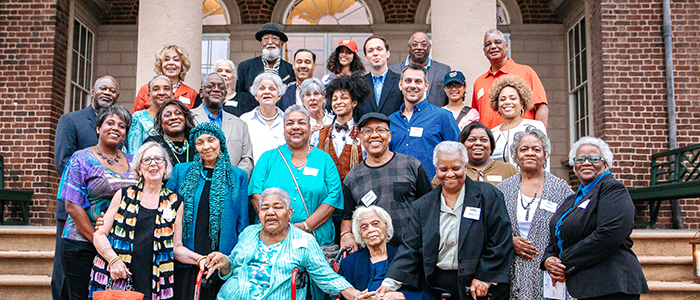Mary Hemings Bell (1753-after 1834), born "Mary Hemings" probably in Charles City County, was the oldest known child of Elizabeth Hemings. After the division of the estate of Martha Jefferson's father, John Wayles, in 1774, Bell was brought with her family to Monticello, where she was an enslaved household servant and seamstress.[1] She became a property owner in Charlottesville, and she and her descendants played integral roles in the Charlottesville community. Between 1772 and 1783, Mary Hemings Bell gave birth to six children, some of whom were separated from her through sale and some of whom lived in freedom.


While Jefferson was in Paris as minister to France in the 1780s, a Charlottesville merchant, Thomas Bell, leased Mary Hemings Bell as a domestic servant from Jefferson. She went with her two youngest children, Joseph and Betsy – Jefferson had already given her two eldest, Daniel and Molly, to his sister and daughter. Mary Hemings Bell became Thomas Bell's common-law wife and his property when she asked Jefferson to sell her to her husband. Thomas Bell unofficially freed her, acknowledged their two children, and bequeathed his estate to them. Jefferson refused to sell Mary Hemings Bell's older children, Joseph Fossett and Betsy Hemmings, who remained in slavery at Monticello.
Mary Hemings Bell maintained close ties with her still enslaved children, who were only eleven and nine years old when separated from their mother. Because of her accepted status as free and her life estate in Bell's property after his death in 1800, she could provide them with items of clothing and personal possessions that were inaccessible to other slaves. During the crisis of 1827, when members of her family were sold at the Monticello dispersal sale, Mary Bell's economic standing enabled her son Joseph Fossett to arrange for the purchase of a number of his own children.

Mary Hemings Bell and her descendants were an integral part of the Charlottesville community throughout the years. Thomas and Mary Bell's free daughter, Sally Jefferson Bell, married Jesse Scott, an accomplished musician. Scott and his sons played for dances and entertainments all over Virginia.[2] Mary Hemings Bell and her descendants occupied a house on Charlottesville's Main Street for a century.
Learn more about Mary Hemings Bell and her extraordinary descendants at the Getting Word - The African American Families of Monticello »
It is uncertain who Bell’s father was, and the paternity of some of her children is also disputed. She was the first of four children that Elizabeth Hemings had with an unknown black man, only described later as a “darker” mulatto.[3] According to the oral history of Bell’s descendants, however, she was the daughter of an unknown white man. The paternity of Bell’s four eldest children, Daniel, Molly, Joseph, and Betsy, is also unknown. One son, Joseph Fossett, is believed to have been the child of William Fossett – a free white craftsman living at Monticello during the construction of Thomas Jefferson’s home. Interracial sexual relations were not uncommon at Monticello, and while it is impossible to determine how exploitative or mutual those connections were, some scholars have argued that naming practices can possibly be a clue.[4] Whereas other children of free white workers on the mountain were not given their father’s name, Joseph Fossett was, and the name Fossett survived in the family as a given name for future generations. This possibly indicates a mutual relationship of affection between Mary Hemings Bell and William Fossett before – and perhaps after – he left Monticello in 1779.[5]
ADDRESS:
931 Thomas Jefferson Parkway
Charlottesville, VA 22902
GENERAL INFORMATION:
(434) 984-9800
